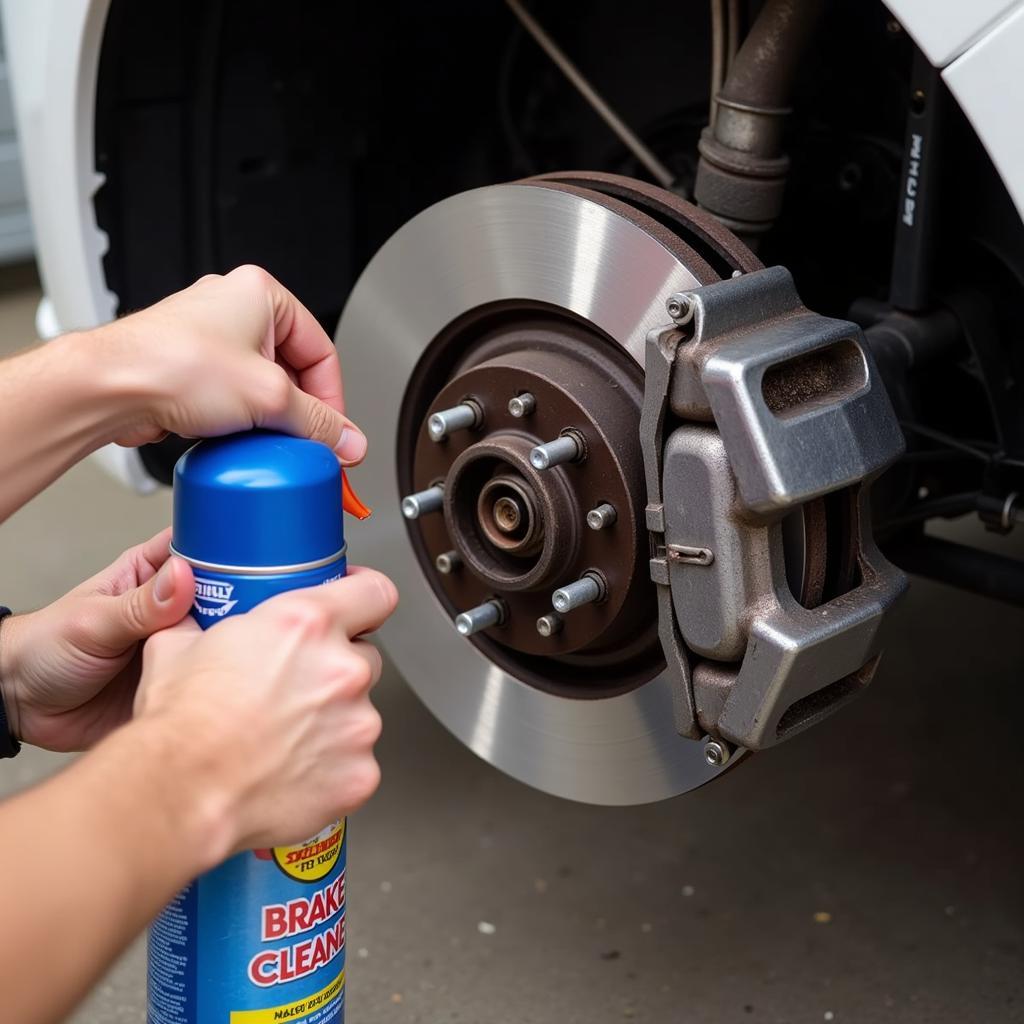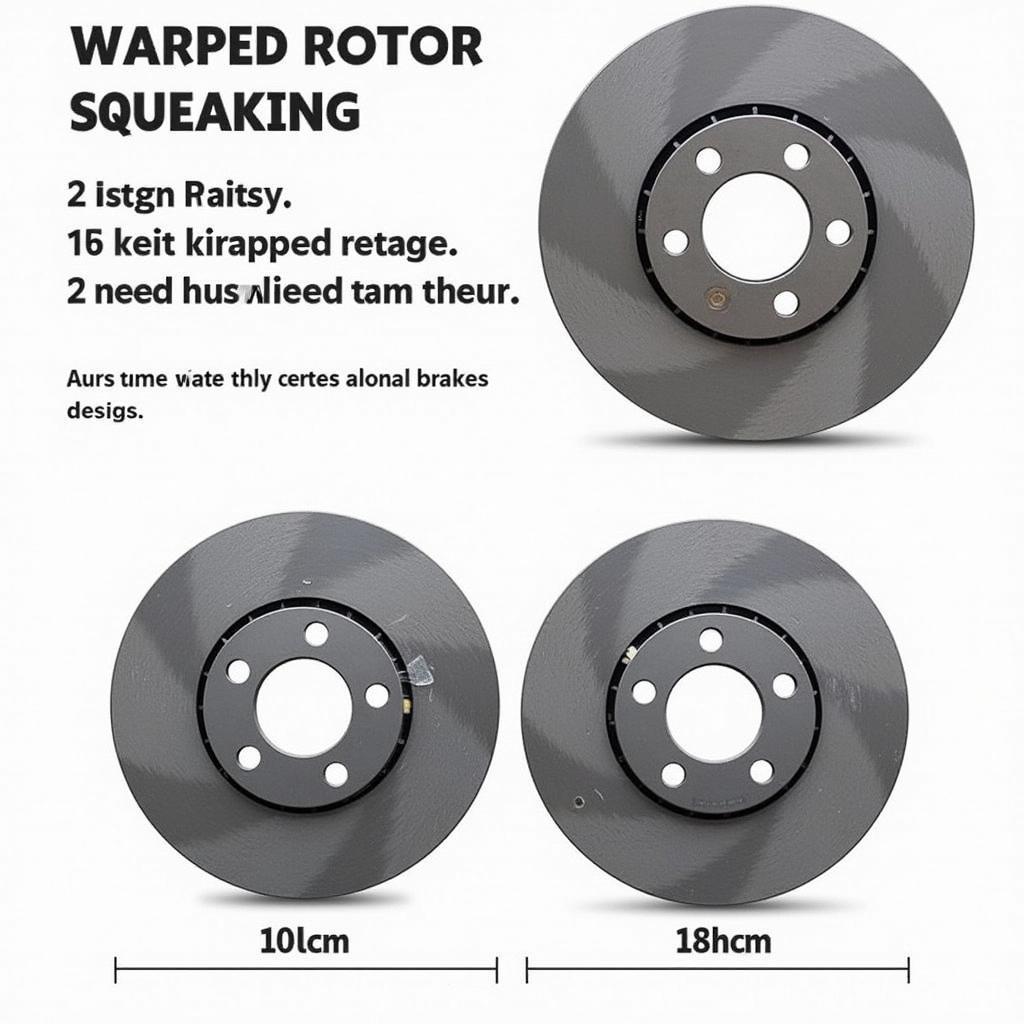Squeaking car brakes can be incredibly annoying and, more importantly, a sign of a potential safety issue. Addressing a Home Fix For Squeaky Car Brakes should be a priority, but it’s essential to understand the underlying cause before attempting any DIY solutions. This article will guide you through common causes of squeaking brakes and provide practical solutions you can implement at home. fixing squek in car
Why are My Car Brakes Squeaking?
There are several reasons why your car brakes might be squeaking, ranging from simple environmental factors to more serious mechanical problems. Identifying the root cause is the first step towards effectively silencing that irritating squeal.
Common Causes of Squeaking Brakes
-
Brake Pad Wear: One of the most common culprits is worn brake pads. Most brake pads have built-in wear indicators, small metal tabs designed to make a squealing noise when the pad material gets too thin. This is a clear signal it’s time for a replacement.
-
Moisture and Rust: Morning dew or rain can cause a thin layer of rust to form on the brake rotors. This rust can create friction and cause squeaking, which usually disappears after a few brake applications.
-
Glazed Brake Pads: Excessive heat can cause the brake pad material to harden and become “glazed.” This creates a smooth, shiny surface that doesn’t grip the rotor effectively, leading to squeaking and reduced braking performance.
-
Stuck Caliper Pins: Caliper pins allow the brake caliper to move freely. If these pins become seized due to rust or dirt, the brake pads may not retract properly, causing constant contact with the rotor and resulting in a persistent squeak.
-
Cheap Brake Pads: Lower quality brake pads may contain harder materials that are more prone to squeaking. Investing in quality brake pads can significantly reduce the likelihood of noise issues.
How Can I Fix Squeaky Brakes at Home?
While some brake issues require professional attention, there are a few things you can try at home to quiet those noisy brakes.
-
Inspect Your Brake Pads: Check the thickness of your brake pads. If they are worn down close to the wear indicators, it’s time to replace them.
-
Clean the Brakes: Use a brake cleaner spray to remove dirt, debris, and rust from the brake calipers, rotors, and pads. This can often resolve squeaking caused by environmental factors.
 Cleaning Car Brakes to Eliminate Squeaking
Cleaning Car Brakes to Eliminate Squeaking
-
Lubricate Caliper Pins: Carefully remove the caliper pins, clean them with a wire brush, and apply a high-temperature brake lubricant. This can help free up stuck caliper pins and restore proper brake function.
-
Bed-in New Brake Pads: If you’ve recently installed new brake pads, they may need to be “bedded in.” This process involves a series of controlled stops from moderate speeds to help the pads mate evenly with the rotors.
“Neglecting squeaky brakes can lead to more serious problems down the road. A simple inspection and cleaning can often prevent costly repairs,” says John Smith, Senior Automotive Technician at Smith Auto Repair.
When Should I Take My Car to a Mechanic?
If your brakes continue to squeak after trying these home remedies, it’s crucial to consult a qualified mechanic. Persistent squeaking could indicate a more serious problem, such as warped rotors or a faulty caliper.
 Warped Brake Rotor Causing Squeaking
Warped Brake Rotor Causing Squeaking
“Ignoring persistent brake squeaks can compromise your safety. It’s always best to err on the side of caution and seek professional advice,” advises Sarah Jones, Certified Brake Specialist at Jones Brake and Rotor Services.
Conclusion
Addressing a home fix for squeaky car brakes can save you time and money. However, it’s crucial to diagnose the problem correctly and take appropriate action. By understanding the common causes of squeaking brakes and following the steps outlined in this article, you can often resolve the issue yourself. However, if the squeaking persists or you’re unsure about any aspect of brake repair, don’t hesitate to contact a qualified mechanic. For expert advice and assistance, reach out to AutoTipPro at +1 (641) 206-8880 or visit our office at 500 N St Mary’s St, San Antonio, TX 78205, United States.






Leave a Reply